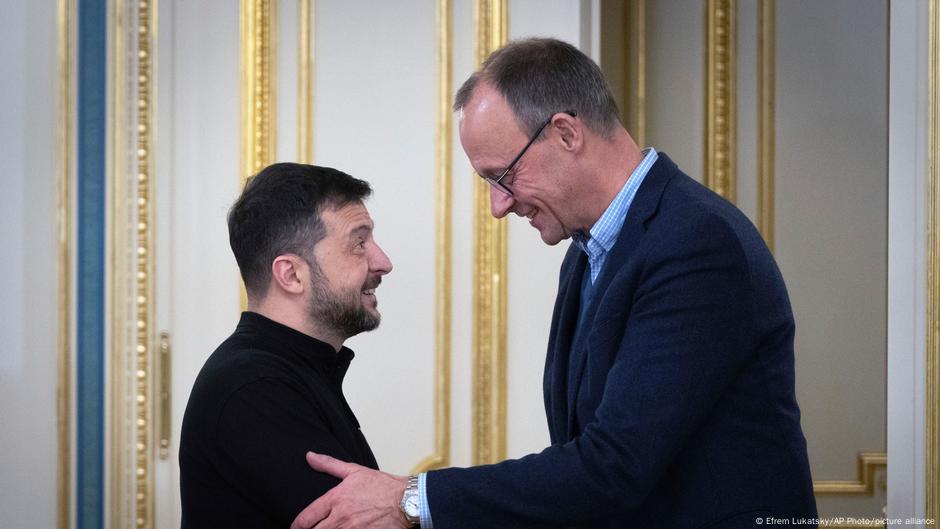“The world will not wait for us. We must now rapidly regain our ability to act,” emphasized CDU leader Friedrich Merz on the eve of his election victory. Likely to be the next German chancellor, Merz already has an ambitious timetable: he wants to form a new federal government by Easter, if possible — by mid-April, “So that we are once again present in Europe, and internationally: Germany will be reliably governed again.”
And there are high expectations of Germany — Merz has learned this from many discussions he has held with politicians from friendly countries in recent weeks. Germany is always asked to show commitment and take its own initiatives when it comes to the topics of supporting Ukraine, Europe’s defense capabilities and trans-Atlantic relations.
US policy change forcing Germany to act
That has been especially true since Donald Trump reentered the White House last month, already severely damaging the trans-Atlantic relationship during his first weeks in office.
With respect to Ukraine policy, Trump has so far rejected a common course with Europe. Washington has been negotiating an end to the war directly with Moscow —expressly without the participation of Ukrainian President Volodymyr Zelenskyy, whom Trump has disparaged as a “dictator.”
After the US president’s latest statements, Merz told the German TV show “Berliner Runde” on election night that “the Americans — at least this part of the Americans, this administration — are largely indifferent to Europe’s fate.” An absolute priority for Merz is to strengthen Europe as quickly as possible, “so we can really achieve independence from the US, step by step,” he said.
However, Merz also wants to “do everything possible” to maintain a good transatlantic relationship. “If it is destroyed, that would not only be detrimental to Europe, it would also be detrimental to America,” Merz said on Monday at the CDU party headquarters in Berlin.
And that is why, on election night, Merz spoke to French President Emmanuel Macron, who was then en route to Washington to meet with Donald Trump. During his first post-election press conference, Merz emphasized that his positions match those of Macron.
Before he can focus on German foreign policy, however, Merz’s first task will be to put together a government capable of taking action. With only 28.5% of the vote, the conservative union of Christian Democrats and the Christian Social Union (CDU/CSU) require a coalition partner. Merz is hoping for a governmental alliance with the Social Democratic Party (SPD) – who plummeted to just over 16% of the vote in the election. As a coalition, the groups would have enough seats for a stable Bundestag majority.
There are differences, however. The CDU has criticized the SPD, especially former Chancellor Olaf Scholz, for not approaching European partners enough. For example: in response to Trump’s foreign policy, the French government initiated an informal European summit, while Berlin took no action at all.
A united and unified Europe
“Germany must once again assume a leading role in Europe – not from the top down, but with France, with Poland, with a strong European Union,” emphasized CDU Secretary General Carsten Linnemann during the election campaign.
The CDU/CSU also criticized Scholz’s last phone call to Russian President Vladimir Putin in mid-November. The CDU believes initiatives that are coordinated with partners – such as France, the UK and Poland – are more effective. “The message must be very clear: Europe is united and unified,” stressed Merz.
The political parties are expected to find a common line on Ukraine policy. They are in agreement that negotiations to end the war in Ukraine should not be conducted without Ukrainian and European participation. It is also clear that Germany will continue to supply Ukraine with weapons under a new government.
US-drafted UN resolution shows rift with Europe
However, the two parties have had differences with respect to Ukraine. During the election campaign, Merz endorsed the delivery of German Taurus cruise missiles to Ukraine. Such missiles have a range of up to 500 kilometers, and could be used against targets on Russian territory. Scholz always rejected delivering Taurus cruise missiles to Ukraine, arguing that Germany should not be drawn into the war.
More money for defense
Since Russia’s attack on Ukraine on February 24, 2022, the German government has provided around €28 billion ($29 billion USD) in military aid to Ukraine. That makes Germany Kyiv’s second largest supporter after America. Washington now says that further aid to Ukraine is primarily Europe’s responsibility, and that Europe must take on more responsibility for its own defense capabilities.
All of that will cost a lot of money. Given the fact that Germany’s national budget is already deep in the red, this is likely to be the most contentious issue during coalition negotiations. Where should the funds should come from? From new loans – or from reallocations in the national budget? The SPD believes taking on new debt is unavoidable. Election victor Merz has a completely different view: he wants to focus on economic growth, and has been calling for cuts in social benefits. That is unacceptable to the Social Democrats.
Why Germany isn’t leading Europe’s defense
Despite the tight budget, in order for Germany to continue meeting its NATO obligations, the defense budget must increase significantly in the coming years. €80 billion ($83.7 billion USD) will be needed for the Bundeswehr by 2028. Should Germany’s federal budget remain at its most recent level of around €52 billion ($54.4 billion USD), that goal will be unachievable.
Invitation to Netanyahu despite ICC arrest warrant
Although Merz did not give details about Germany’s future Middle East policy during his first post-election press conference, he had a message for Israeli Prime Minister Benjamin Netanyahu, whom he says he knows well. Merz explained that he had promised the Israeli leader “that he could visit Germany, and leave again, without being arrested in Germany.” This promise comes despite an arrest warrant that was issued by the International Criminal Court against Netanyahu, for alleged crimes against humanity and war crimes in Gaza.
Unlike the US for example, due to being a state party to the ICC founding statute, Germany is legally obliged to respect the warrant and arrest Netanyahu should he step foot on German soil. Merz, however, has stated his opinion that it is “an absurd idea” that an Israeli prime minister could not visit Germany.
Expert: Germany obliged to abide by ICC decisions
This article was originally written in German.












